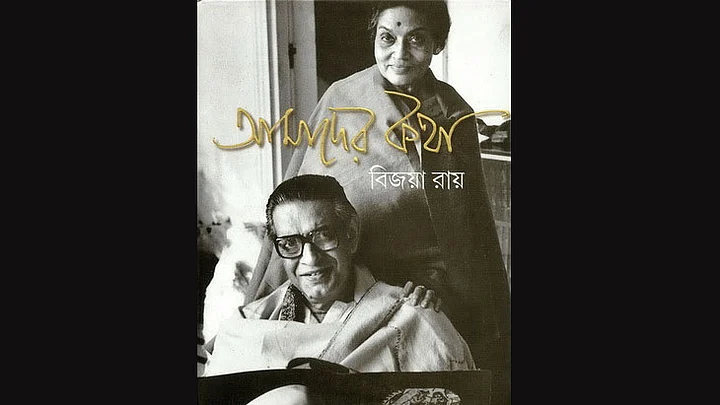Bijoya Ray passed away in Calcutta yesterday at the age of 98.
In 1988 as a correspondent of The Illustrated Weekly of India I met her in her home at 1/1 Bishop Lefroy Road in South Calcutta, where the low-profile wife of the celebrated film-maker spoke to me about her husband, Satyajit Ray, who was at that time directing Ganashatru, based on Henrik Ibsen’s play, An Enemy of the People.
Excerpts from a first-person account.
“Having lived with a man for 40 years one tends to forget that he is considered a genius by the world. Especially when Manik, as I call him, doesn’t behave like one. He is a very simple man, not arrogant or snobbish at all.
“Being a very ordinary person myself, I would have found it very difficult to live with him otherwise. It’s not easy to talk about him. I am very shy. I hate to be in the public eye. Fortunately for me, he’s tall and has broad shoulders. I can hide behind him. We are cousins from my father’s side and knew each other when we were children.
“The question of marriage had never come into my head. We had, of course, got along very well. We were both drawn towards Western classical music and films. This strengthened the special bond we shared.
“My father was a barrister in Patna. When he passed away, my mother, two sisters and I shifted to Calcutta. Here, we moved in with the rest of the family in a huge house. I was 12 years old. I had a large collection of Western classical music records.
“My father was a great lover of Western music as well as a great singer. I too love all kinds of Western classical music—symphonies, concertos, chamber music, I am very fond of opera, particularly Mozart’s. I was fascinated by Manik’s phenomenal ability to remember tunes. If he heard a particular symphony only once, he could reproduce it from the beginning to the end by whistling.
“During the early forties, I had gone to Bombay where I stayed with my sister. I worked in a few films. They were worthless films and I’d rather forget that part of my life. I was basically a loner and just didn’t adjust to the industry in Bombay. Manik came to Bombay a few times and he too stayed with my sister.
“I came to Calcutta once a year. It was strange. Gradually, we fell in love.
We got married on October 20, 1948. My mother-in-law gave in and accepted me as her daughter-in- law gracefully. I am eternally grateful to her for this.
In 1950 Manik and I went to London. Manik, who was working as a visualiser with DJ Keymer (now Clarion Advertising Services) was being sent for a six-month stint.
The managing director of the company was really nice to Manik who began with a monthly wage of Rs 75 and eventually established himself as a top visualiser who was practically indispensable to the company. But Manik was not happy. He didn’t like the fact that he had to keep pleasing clients.
“During our stay in London, we saw 99 films. It was the Italian director De Sica’s Bicycle Thieves that proved to be the turning point. The film really moved us. Manik decided that he too could make a film with amateurs. While we were returning to India, he began writing the script on the ship.
“Three years later, his labour of love, Pather Panchali was born. It had been a struggle. Manik had no producers, no backing. It was the West Bengal government which finally came to our help as my mother-in-law approached a relative of the then chief minister, Dr BC Roy. Those were indeed trying times. I had to pawn my jewels, not once, but several times.
“Once the film was released and Manik’s talents recognized, our struggles were all behind us.
“When he works on a film, it is constantly on his mind. He is almost always thinking of it. I remember moments when the family sits for a cosy chat just before retiring. Suddenly Manik turns to our son and asks, ‘Babu, isn’t it better to make a change here?’ and explains his point of view. Discussions ensue and the issue is thrashed out. I really enjoy these moments. It is quite something for me to see father and son discussing a film. Totally involved with a project, they are blind to the world.
“Manik’s passionate concerns for detail is well known. He chooses the curtains and even explains to the tailor how they are to be stitched. Curios are collected from the homes of friends who willingly oblige. He personally sees to the smallest detail, where, for instance, should a vase be placed. I remember, whenever he’s making a period film, he even designs the heroine’s blouses like he did for Swatilekha in Ghare Baire.
“The cameraman and the art director get remarkable assistance from him. The camera compositions, the camera angles are all decided by him, while the cameraman handles the lighting. Manik even designs the sets to the last detail.
“When the script is ready, he makes detailed illustrations of the sets. To be a good director one must know how to draw, possess an ear for music and know how to tell a story. Manik is an exceptionally creative man.
For me, it has been a fulfilling existence.”
